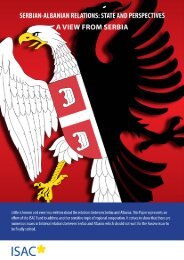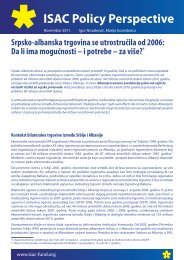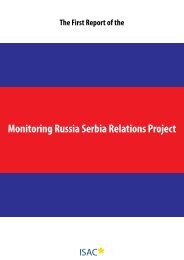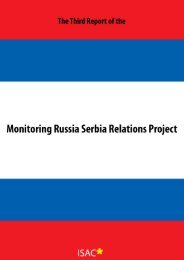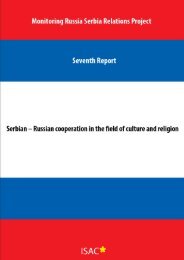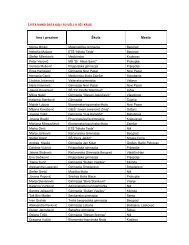the process of security sector reform - ISAC Fund
the process of security sector reform - ISAC Fund
the process of security sector reform - ISAC Fund
You also want an ePaper? Increase the reach of your titles
YUMPU automatically turns print PDFs into web optimized ePapers that Google loves.
István Gyarmati MILITARY REFORMS OF THE 1990s: LESSONS LEARNED FROM THE SUCCESSES AND FAILURES<br />
István Gyarmati MILITARY REFORMS OF THE 1990s: LESSONS LEARNED FROM THE SUCCESSES AND FAILURES<br />
• The military must become transparent to <strong>the</strong> public, including <strong>the</strong><br />
planning and <strong>the</strong> use <strong>of</strong> its budget;<br />
• The rule <strong>of</strong> law must apply to <strong>the</strong> military as well; and<br />
• The military should be open to international cooperation, especially with<br />
neighboring countries.<br />
In order to ensure that <strong>the</strong>se basic principles, which are to guide <strong>the</strong> use and<br />
functioning <strong>of</strong> <strong>the</strong> military, are observed, <strong>the</strong>y must be embodied in legislation and<br />
institutional structures. The executive branch must lead <strong>the</strong> efforts to introduce<br />
legislation ensuring that <strong>the</strong>se principles are enshrined in <strong>the</strong> Constitution and<br />
<strong>the</strong> laws <strong>of</strong> <strong>the</strong> country, and that <strong>the</strong> necessary institutions <strong>of</strong> <strong>the</strong> Parliament and<br />
<strong>the</strong> Government, such as Parliamentary oversight committee(s) and <strong>the</strong> interagency<br />
coordination body(ies) are created and adequately staffed by a mix <strong>of</strong><br />
civilian and military personnel.<br />
The most important legislation includes:<br />
• <strong>the</strong> relevant parts <strong>of</strong> <strong>the</strong> Constitution and<br />
• laws on national defense and <strong>the</strong> status <strong>of</strong> military personnel, including<br />
pr<strong>of</strong>essionals and conscripts,<br />
Institutions needed include:<br />
• Parliamentary oversight committees for defence, intelligence, foreign<br />
affairs, etc.<br />
• Relevant institutions <strong>of</strong> <strong>the</strong> executive branch ensuring <strong>the</strong> smooth<br />
integration <strong>of</strong> <strong>the</strong> military in <strong>the</strong> Government<br />
• Structures within <strong>the</strong> military to manage cooperation <strong>of</strong> <strong>the</strong> military with<br />
Parliamentary committees and o<strong>the</strong>r non-military structures.<br />
DETERMINE THE ROLES OF THE MILITARY IN THE CONTEXT<br />
OF AN OVERALL NATIONAL SECURITY STRATEGY<br />
The starting point in thinking about <strong>reform</strong> <strong>of</strong> <strong>the</strong> military itself must be <strong>the</strong><br />
determination <strong>of</strong> <strong>the</strong> role <strong>the</strong> military will be expected to play in <strong>the</strong> <strong>security</strong><br />
equation <strong>of</strong> any given country. These roles can only be determined on <strong>the</strong> basis<br />
<strong>of</strong> a realistic threat assessment, which in turn, must be based on <strong>the</strong> evaluation<br />
<strong>of</strong> <strong>the</strong> <strong>security</strong> situation <strong>of</strong> <strong>the</strong> country, <strong>the</strong> region and <strong>the</strong> trans-Atlantic region,<br />
kin <strong>the</strong> case <strong>of</strong> a European country.<br />
The conclusion is that any <strong>reform</strong> <strong>process</strong> must start with <strong>the</strong> elaboration <strong>of</strong> a<br />
National Security Strategy (or Policy) for <strong>the</strong> country. The National Security<br />
Strategy, in simple terms, determines <strong>the</strong> <strong>security</strong> situation <strong>of</strong> <strong>the</strong> country, against<br />
<strong>the</strong> background <strong>of</strong> <strong>the</strong> <strong>security</strong> situation in <strong>the</strong> immediate neighborhood and<br />
broader region where <strong>the</strong> country is situated. In elaborating such a strategy, <strong>the</strong><br />
notion <strong>of</strong> <strong>security</strong> must be based on a modern understanding <strong>of</strong> <strong>security</strong>, which is<br />
comprehensive, cooperative, coherent, common, collective and/or indivisible.<br />
Comprehensive Security<br />
Comprehensive <strong>security</strong> means that all aspects <strong>of</strong> <strong>security</strong> must be taken into<br />
account. Military strategy, which used to determine <strong>the</strong> <strong>security</strong> <strong>of</strong> a country<br />
over many centuries, remains an important, but not <strong>the</strong> only, nor even <strong>the</strong> most<br />
important part <strong>of</strong> <strong>security</strong>. Political <strong>security</strong>, economic <strong>security</strong>, <strong>the</strong> situation <strong>of</strong><br />
human and minority rights and <strong>the</strong> environment are important factors, which<br />
must be taken into account when determining <strong>the</strong> <strong>security</strong> situation <strong>of</strong> any given<br />
country. The <strong>security</strong> policy <strong>of</strong> <strong>the</strong> country should be coherent, too. Coherent<br />
means that elements <strong>of</strong> <strong>security</strong> policy must streng<strong>the</strong>n each o<strong>the</strong>r, or at least,<br />
must not contradict and weaken each o<strong>the</strong>r.<br />
Cooperative Security<br />
Cooperative <strong>security</strong> means that <strong>the</strong> <strong>security</strong> <strong>of</strong> any given country can much more<br />
effectively be achieved − perhaps can only be achieved − through cooperation.<br />
Confrontation can only lead to fur<strong>the</strong>r tensions and will not produce lasting<br />
results. Cooperation, on <strong>the</strong> o<strong>the</strong>r hand, creates <strong>the</strong> basis <strong>of</strong> mutual understanding<br />
and, thus, reduces <strong>the</strong> need for o<strong>the</strong>r guarantees <strong>of</strong> <strong>security</strong>, including military<br />
ones.<br />
Common Security vs. Collective Security<br />
The notions <strong>of</strong> common and collective <strong>security</strong> are <strong>of</strong>ten confused. Common<br />
<strong>security</strong>, as embedded in <strong>the</strong> Charter <strong>of</strong> <strong>the</strong> Untied Nations, brings countries toge<strong>the</strong>r<br />
in a common understanding and practice <strong>of</strong> <strong>security</strong>. Self-defense is every<br />
country’s right, but can only be exercised within certain, self-imposed limits and<br />
70 71





